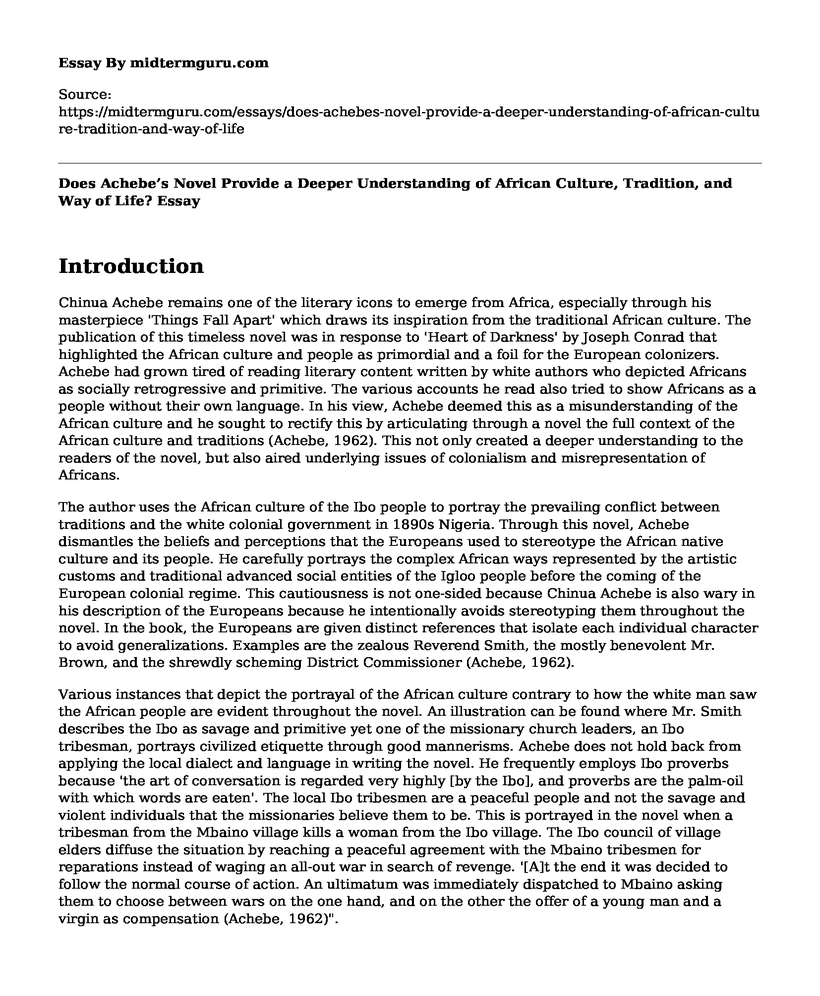Introduction
Chinua Achebe remains one of the literary icons to emerge from Africa, especially through his masterpiece 'Things Fall Apart' which draws its inspiration from the traditional African culture. The publication of this timeless novel was in response to 'Heart of Darkness' by Joseph Conrad that highlighted the African culture and people as primordial and a foil for the European colonizers. Achebe had grown tired of reading literary content written by white authors who depicted Africans as socially retrogressive and primitive. The various accounts he read also tried to show Africans as a people without their own language. In his view, Achebe deemed this as a misunderstanding of the African culture and he sought to rectify this by articulating through a novel the full context of the African culture and traditions (Achebe, 1962). This not only created a deeper understanding to the readers of the novel, but also aired underlying issues of colonialism and misrepresentation of Africans.
The author uses the African culture of the Ibo people to portray the prevailing conflict between traditions and the white colonial government in 1890s Nigeria. Through this novel, Achebe dismantles the beliefs and perceptions that the Europeans used to stereotype the African native culture and its people. He carefully portrays the complex African ways represented by the artistic customs and traditional advanced social entities of the Igloo people before the coming of the European colonial regime. This cautiousness is not one-sided because Chinua Achebe is also wary in his description of the Europeans because he intentionally avoids stereotyping them throughout the novel. In the book, the Europeans are given distinct references that isolate each individual character to avoid generalizations. Examples are the zealous Reverend Smith, the mostly benevolent Mr. Brown, and the shrewdly scheming District Commissioner (Achebe, 1962).
Various instances that depict the portrayal of the African culture contrary to how the white man saw the African people are evident throughout the novel. An illustration can be found where Mr. Smith describes the Ibo as savage and primitive yet one of the missionary church leaders, an Ibo tribesman, portrays civilized etiquette through good mannerisms. Achebe does not hold back from applying the local dialect and language in writing the novel. He frequently employs Ibo proverbs because 'the art of conversation is regarded very highly [by the Ibo], and proverbs are the palm-oil with which words are eaten'. The local Ibo tribesmen are a peaceful people and not the savage and violent individuals that the missionaries believe them to be. This is portrayed in the novel when a tribesman from the Mbaino village kills a woman from the Ibo village. The Ibo council of village elders diffuse the situation by reaching a peaceful agreement with the Mbaino tribesmen for reparations instead of waging an all-out war in search of revenge. '[A]t the end it was decided to follow the normal course of action. An ultimatum was immediately dispatched to Mbaino asking them to choose between wars on the one hand, and on the other the offer of a young man and a virgin as compensation (Achebe, 1962)".
Conclusion
In my opinion, I think that Achebe achieved what he articulated in his essay, "An Image of Africa?" through the contents of 'Things Fall Apart'. Not only does Achebe extensively apply the use of the Ibo language and linguistic devices, but he also utilizes various cultural aspects of the Ibo people to depict them as having their own tradition customs and practices that the Europeans mistook for savagery and lack of civilization. The use of the Ibo language is in defiance of the lack-of-language mentality held by Europeans about Africans.
Reference
Achebe, C. (1962). Things fall apart. London: William Heinemann Ltd.
Cite this page
Does Achebe's Novel Provide a Deeper Understanding of African Culture, Tradition, and Way of Life?. (2022, Aug 18). Retrieved from https://midtermguru.com/essays/does-achebes-novel-provide-a-deeper-understanding-of-african-culture-tradition-and-way-of-life
If you are the original author of this essay and no longer wish to have it published on the midtermguru.com website, please click below to request its removal:
- The Hollow Men by Eliot - Poetry Analysis Paper Example
- Essay on the Mood Organ From Do Androids Dream of Electric Sheep by Phillip Dick
- Essay on Of Mice and Men by John Steinbeck
- Critical Essay on Instances of Wisdom and Arrogance in 'Antigone'
- Perceiving Poetry With Heart, Eyes, and Ears in Intermedial Age - Essay Sample
- Dreams of Distant Lives: A Symbol of Love and Emotion - Essay Sample
- Marduk's Cosmic Victory: Babylonian Creation Myth Revealed on Tablet - Essay Sample







